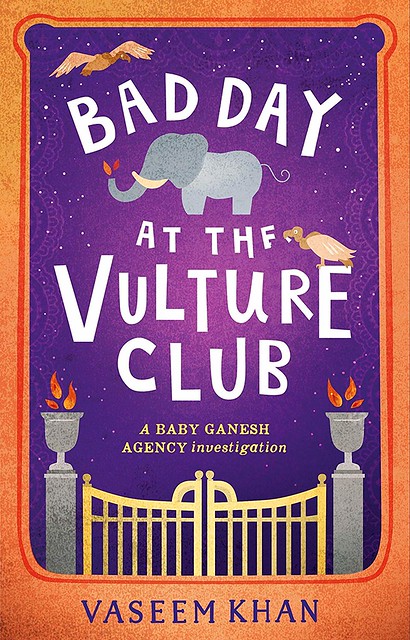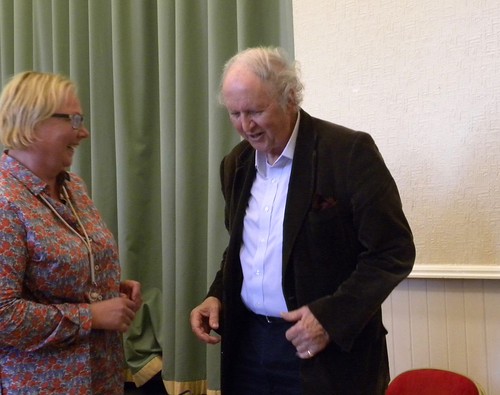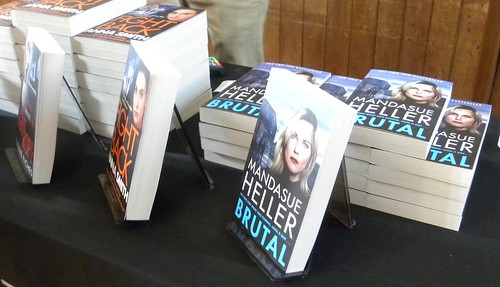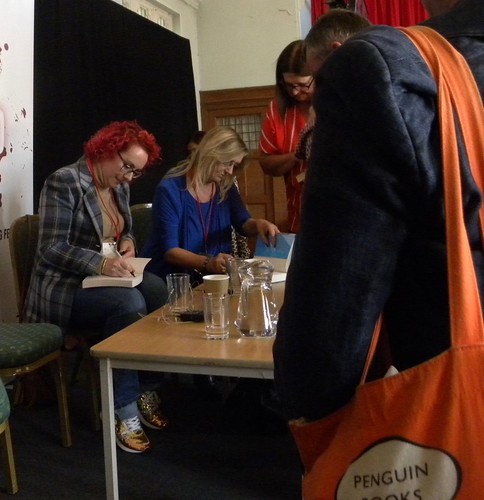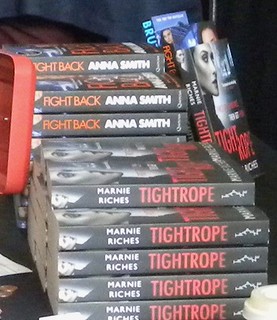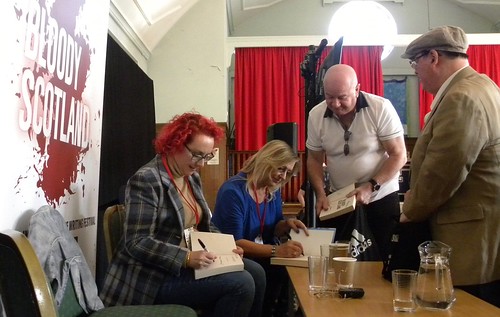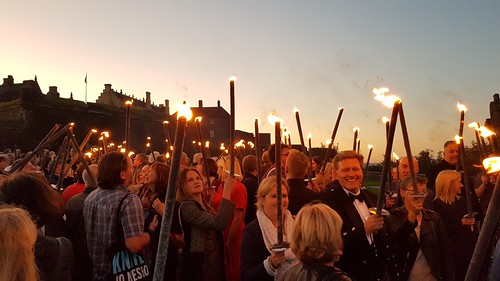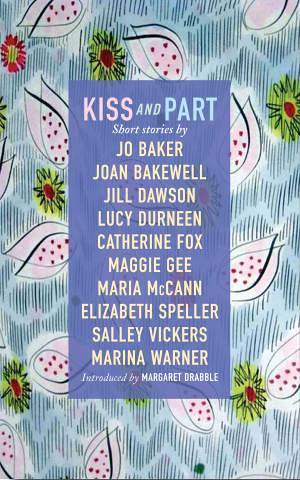And I’m afraid we all laughed at the memory of Catriona McPherson’s grandmother’s funeral. (But I’d say we were meant to.)
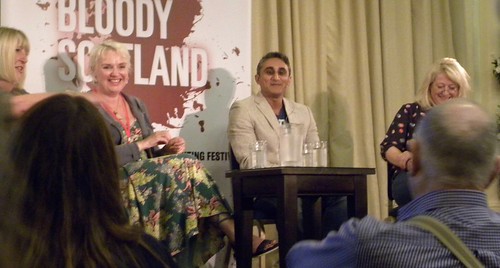
Last night at the Golden Lion was one of the very best Bloody Scotland events I’ve known, and I’ve been to some good ones. As Vaseem Khan said, it was quality over quantity, referring to the fact that he and Catriona and Lynne Truss were competing with Ian Rankin and Nicola Sturgeon down the road. But really, who’d choose those two over these three, so ably chaired by Laura Wilson, who’s just as fun and capable as I remembered from CrimeFest eleven years ago?
Right, so it was a discussion on cosy crime with three authors and a select audience, which contained, among others, Catriona’s parents. I liked her parents and wouldn’t mind borrowing them.
But was it really cosy crime we were dealing with? No, it was more whether you can kill kittens, and about writing with humour. Which, as far as I’m concerned is the best. Well, perhaps not the kitten-killing.
Apparently all cats are psychopaths.
It was actually a fairly animal-centred discussion, ably led by Baby Ganesh, Vaseem’s little elephant. While it was his detective Chopra’s wife’s involvement with where to deposit your poo that got us onto this, it was Catriona’s question whether he never worried whether Ganesh might, well, deposit, something somewhere unsuitable as well, which took us straight to Blue Peter’s elephant poo memory. This made us laugh a lot.
(Here I have to insert an apology to Lynne. I am not at all sure I get my thats and whiches and anything else right. But that’s the way I am. I loved Eats Shoots and Leaves. I just didn’t learn anything.)
And let’s get the panda out of the way right now. Not allowed to say what Vaseem thinks about pandas. But he likes vultures. He gets mail from fans, warning him not to let anything bad happen to Ganesh. There is no great plan for his little elephant, since when he wrote the first book he didn’t expect to get published, or that there would be more books. Ganesh will obviously outlive Chopra.

This makes dogs more suitable to your plots; they won’t live as long. But this thing with age is difficult. Apparently Catriona and her Dandy were the same age in 2002 when they started out, but now Dandy is four years younger than her.
Catriona wanted to write her period crime as though it was written back then, and the greatest praise she’s had was the comment that it was just like a novel you might encounter in a wet Norfolk cottage (and not in a good way). Or, Dan Brown meets Barbara Pym. Her problem is that the action happens in the shadow of WWI, while the reader knows what is to come.
Lynne’s novels are set in Brighton in 1957. She wanted to go back to a time when her parents were young, and while it’s easy enough to know what was in the cinema at the time, it’s harder to get people to act the way they did. Do you let them swear, or not? The criminals can’t be seen to swear, even if they would have.
And you certainly didn’t swear in the wet Norfolk cottage.
Murder on the other hand is fine. Even of kittens.
What all three authors were annoyed by is that cosy crime is seen as a ‘guilty pleasure’ and as not proper books, and you can’t be funny. This snobbery is so unfounded.
Police in Brighton were notoriously corrupt, and Lynne wanted to write about the ‘relentless idiocy’ of her stupid policemen. She quite enjoys the sexism from the 1950s, meaning the police can’t even imagine that a working class woman could be the villain. But Lynne doesn’t set out to scare people.
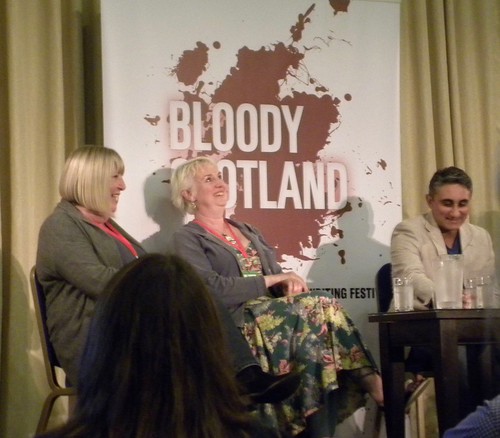
This panel almost fought to chat to each other, and to ask questions, and it was all interesting and fun, and if I ever get one of those ‘who would you invite to dinner?’ opportunities, Catriona, Lynne and Vaseem will be the ones, along with Laura. And hopefully Catriona’s parents. Maybe their friends whom I eavesdropped on outside on the pavement afterwards.
Before that afterwards, there was the signing. I already had books by Vaseem and Catriona, but hurriedly bought Lynne’s book as well. It was that kind of event. Vaseem insisted on taking a selfie with me, even after looking dubiously at my [conventional] camera, realising that no selfies would be coming from that. He had a mobile to hand, and now I’m afraid the internet will explode once that goes on Twitter.
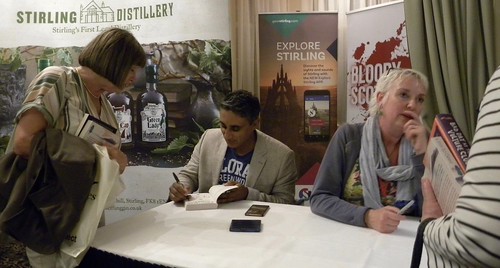
Catriona remembered the Witch, even after so many months, after just the one review. I might have said I now need extra time in my life to be able to read all her books, but all she could offer was more books… Like the fourth in her trilogy. And she couldn’t speak to me until she’d written down the ‘just arrived’ idea for her new book title on the back of the Bloody Scotland programme.
And Lynne, well, her book on the pitfalls on grammar and punctuation has put her forever in my, erm, good books. It’s like talking to royalty. Her next book will be the impressively titled Murder by Milk Bottle.
Talking about the future, Vaseem clearly has too much time on his hands, as Chopra and Ganesh will be joined by a new series, about a female Indian detective in the 1950s.
I really will need that extra time.


